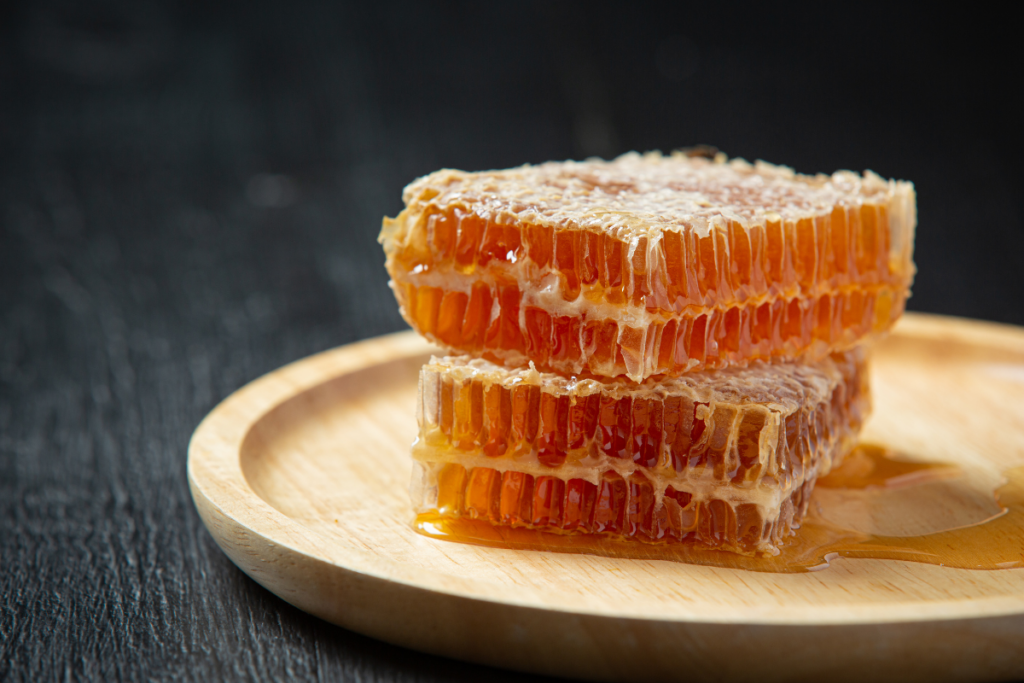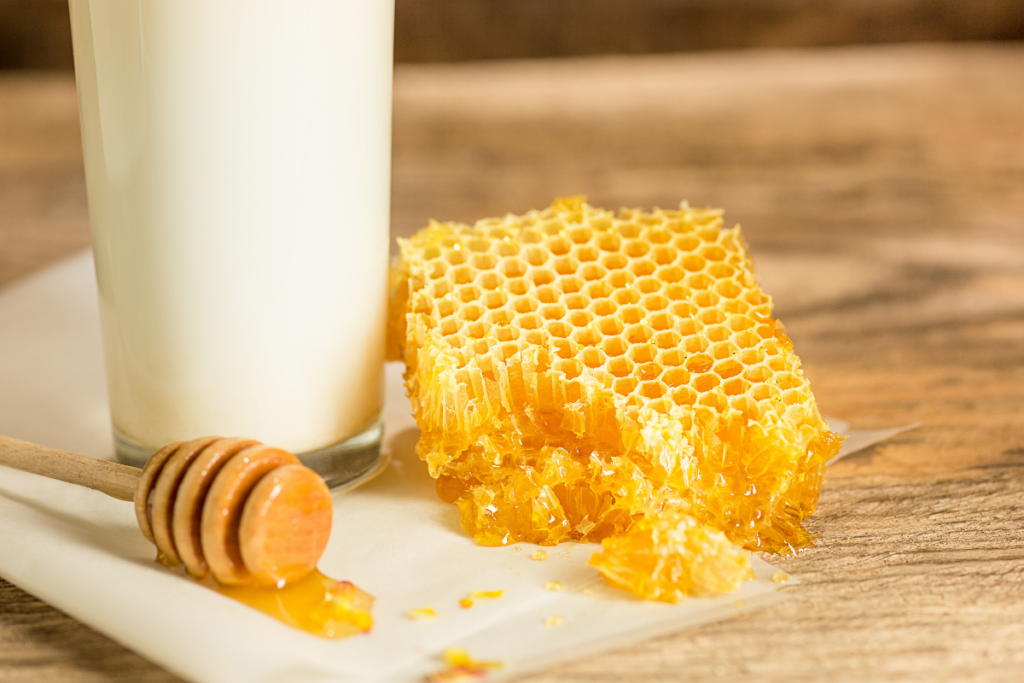Bees are nature’s alchemists, transforming nectar gathered from flowers into the golden elixir we know as honey. But have you ever thought about going a step further and eating not just the honey, but the honeycomb as well? This waxy, hexagonal substance might seem a bit unconventional to some, but you’d be surprised to know that it’s not just edible – it’s also brimming with health benefits.
In this article

Is honeycomb a healthy choice? Honeycomb, being a natural product created by bees, contains several health benefits such as antioxidants, and it can contribute to heart health, digestion, and immunity. However, like any food, it should be consumed in moderation as part of a balanced diet, and individuals with allergies need to be cautious.
What are the nutritional components of Honeycomb?
Honeycomb is a natural product made by honey bees and contains several nutritional components. These components primarily come from the honey stored within the honeycomb structure, but the wax itself may also contribute some minor nutritional elements. Here are the key nutritional components of honeycomb:
- Sugars: Honey, the primary component of honeycomb, is rich in simple sugars, predominantly fructose, and glucose. These sugars are a primary source of quick energy for the body.
- Vitamins and Minerals: Honeycomb contains trace amounts of various vitamins and minerals. These can include vitamins like B2, B6, and C, and minerals like calcium, iron, magnesium, and potassium.
- Antioxidants: Honeycomb contains a variety of antioxidants, which can help to protect the body from damage by harmful free radicals. These antioxidants include flavonoids and phenolic compounds.
- Enzymes: Honeycomb contains various enzymes introduced by bees during the honey production process. These include invertase, which breaks down sucrose into glucose and fructose, and glucose oxidase, which helps to preserve the honey.
- Fiber: The wax of the honeycomb, which is also edible, contains a type of nondigestible carbohydrate known as fiber. While beeswax is not generally considered a significant source of fiber, it can contribute to your daily fiber intake.
- Pollen and Propolis: Honeycomb can contain traces of pollen and propolis (a resinous compound that bees use as a sealant in their hive). Both of these substances have been associated with various health benefits, including anti-inflammatory and antimicrobial effects.
The composition of a honeycomb is influenced by factors such as bee species, flower types, and the bees’ living environment. Different bees create unique honeycombs based on their physiology, while the nectar from various flowers contributes to flavor variations. Environmental conditions shape honeycomb structure, reflecting the intricate relationship between bees, flowers, and their surroundings.
Does honeycomb have any medicinal properties?
Honeycomb itself does not have any direct medicinal properties. However, honey, which is commonly found within honeycombs, has been studied for its potential health benefits. The medicinal properties associated with honey are attributed to its composition and certain compounds it contains. Here are some of the potential medicinal properties of honey:
- Antibacterial properties: Honey has been used for centuries as a natural remedy for wounds and infections due to its antibacterial properties. It contains hydrogen peroxide, low water activity, and acidity, which create an inhospitable environment for bacteria to grow.
- Wound healing: The use of honey in wound care, particularly in cases of burns, has shown promising results in promoting wound healing. Honey’s antimicrobial properties, ability to maintain a moist environment, and the presence of certain enzymes are thought to contribute to its wound-healing effects.
- Cough suppression: Some studies have suggested that honey can be effective in reducing cough symptoms, especially in children. It may help soothe the throat and alleviate irritation, providing temporary relief from coughing.
- Antioxidant activity: Honey contains various antioxidants, such as phenolic compounds, which can help neutralize free radicals in the body and reduce oxidative stress. This antioxidant activity may have potential benefits for overall health and reduce the risk of certain diseases.
- Anti-inflammatory effects: Certain types of honey, such as Manuka honey, have been found to possess anti-inflammatory properties. This can be beneficial for conditions involving inflammation, such as gastrointestinal issues or inflammatory skin conditions.
It’s important to note that the specific medicinal properties and effectiveness of honey can vary depending on its type, quality, and processing methods. It’s always advisable to use honey as a complementary therapy and consult with a healthcare professional for proper medical advice, especially if you have specific health concerns or conditions.
Can a diabetic person take honeycomb?
People with diabetes must monitor their sugar intake and manage their blood sugar levels carefully. Honeycomb, which contains sugars like glucose and fructose, can impact blood sugar levels. Although honeycomb has health benefits as a natural sweetener, it still contains carbohydrates and sugars that can raise blood sugar. Thus, diabetics are generally advised to consume honeycomb in moderation and consider their overall carbohydrate intake.

What are the pros and cons of eating honeycomb?
Eating honeycomb can have several pros and cons. Here are some potential advantages and disadvantages to consider:
Pros of Eating Honeycomb:
- Natural and Unprocessed: A honeycomb is a natural and unprocessed form of honey. It is obtained directly from beehives, maintaining its original structure and properties.
- Nutritional Benefits: Honeycomb contains honey, which is rich in antioxidants, enzymes, and trace minerals. These components can provide potential health benefits such as antioxidant protection and potential antibacterial properties.
- Culinary Enjoyment: Honeycomb can add a unique texture and flavor to dishes. It can be enjoyed as a natural sweetener, as a topping for foods like cheese or desserts, or as a standalone treat.
Cons of Eating Honeycomb:
- High Sugar Content: Honeycomb primarily consists of sugars, including glucose and fructose. Consuming honeycomb can raise blood sugar levels, making it important for individuals with diabetes or those watching their sugar intake to exercise caution.
- Caloric Density: It is also calorie-dense due to its sugar content. Overconsumption or not accounting for the calories in honeycomb can contribute to weight gain or hinder weight loss efforts.
- Choking Hazard: Its waxy texture can pose a choking hazard, especially if not chewed thoroughly. It is important to consume it carefully and supervise young children while eating it.
Individuals with specific dietary needs, health conditions, or concerns should consult with a healthcare professional or a registered dietitian for personalized advice. They can provide guidance on incorporating honeycomb into a balanced diet based on individual circumstances.
Can honeycomb intake help in weight management?
Honeycomb intake alone may not be beneficial for weight management. While it is often seen as a natural sweetener with potential health benefits, it is calorie-dense due to its sugar content. Weight management involves creating a calorie deficit, and consuming excessive amounts of honeycomb without considering its calorie content can hinder weight loss efforts or contribute to weight gain.
Frequently asked questions (FAQ)
Got more questions about the benefits of eating honeycomb? Check out some commonly asked questions about this topic below.
Can honeycomb help with allergies?
There is a theory that consuming local honeycomb may help alleviate allergy symptoms due to exposure to small amounts of local pollen present in the honeycomb. However, there is limited scientific evidence to support this claim, and individual experiences may vary. It is always best to consult with a healthcare professional for proper allergy management.
How can honeycomb contribute to heart health?
Honeycomb contains antioxidants that may have a positive impact on heart health. These antioxidants help reduce oxidative stress and inflammation, which are risk factors for heart disease.
Can honeycomb aid in digestion?
Honeycomb contains enzymes that can aid in digestion. These enzymes, such as amylase and invertase, help break down carbohydrates and sugars, making them more easily digestible for the body.
Final Word
With its array of nutritional benefits, honeycomb offers a natural and delicious way to enhance your health and delight your taste buds. If you have found this article informative and insightful, why not share it with a friend or loved one? Spread the knowledge and the joy of honeycomb’s remarkable qualities. And don’t forget to explore my full blog for more tips and insights on health and wellness.
